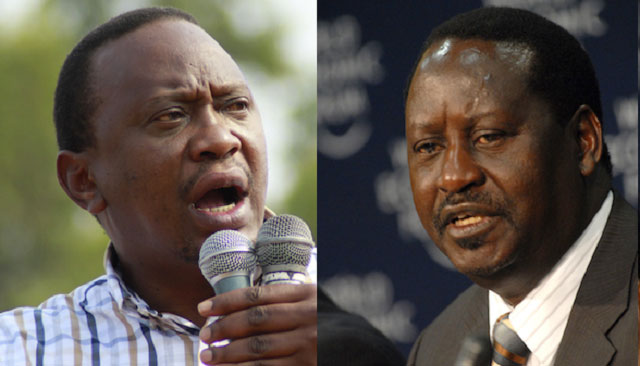
Nairobi, Kenya | AFP | Kenya’s President Uhuru Kenyatta has been declared the winner of the country’s election, but his rival Raila Odinga insists he is the true winner, and the election was stolen from him.
Odinga has said he will outline his strategy to contest the vote on Tuesday. Deadly protests appear to have eased but much is at stake for Kenya, one of east Africa’s largest economies and its most dynamic democracy.
– How did we get here? –
The disagreement erupted just hours after Tuesday’s vote ended, when Odinga insisted preliminary results being announced by the electoral commission (IEBC) were fraudulent.
Such allegations are not new for Odinga, a veteran opposition leader who has stood for president three times previously.
He placed third in 1997, and in both 2007 and 2013 he cried foul.
The 2007 vote — which international observers said was riddled with irregularities — is notorious as it sparked two months of ethnic killings and protests that left 1,100 people dead and 600,000 displaced.
In 2013, he went to court over the elections, and lost.
Despite all that, the 72-year-old is a popular political figure in the country, and his allegations carry weight with his supporters, particularly among his Luo ethnic group who believe they have long been denied political power by Kenyatta’s Kikuyu ethnic group.
– What are Odinga’s complaints? –
Odinga’s National Super Alliance (NASA) coalition claims that hackers breached the IEBC’s electronic voting systems and falsified the results.
Odinga has provided documents allegedly showing a database being manipulated, as well as documents purported to be from the IEBC server showing him to be the true winner.
They also complained they had not seen about 25 percent of the tallying forms meant to back up electronic results streamed directly to the electoral commission’s headquarters.
NASA demanded access to the IEBC’s servers if they were to accept the results of the vote. The coalition has so far ruled out going to court.
The IEBC, for its part, has denied NASA’s claims.
– What’s happening now? –
In poor neighbourhoods in Odinga’s western stronghold Kisumu, and in the slums of the capital Nairobi, rioting started immediately after Kenyatta was declared the winner.
At least 16 people have been killed during the protests, mostly by police bullets, including a young girl hit by a stray bullet while playing on a balcony in the Mathare slum. Police say only six have died — criminals who attacked them.
However by Sunday morning, calm appeared to have returned.
Nairobi, a city of more than three million people, started coming back to life, with businesses cautiously opening after about five days in which businesses were shut and people remained indoors.
– What are Odinga’s options? –
According to law, he has until Friday to file a petition at the Supreme Court, which then has 14 days to hear the case and decide whether the election was valid or not.
However NASA has said this time going to court is not an option, despite pressure from the international community to do so.
If Odinga decides to send his supporters onto the street, he will have to contend with the fact that this is placing them in harm’s way.
Nic Cheeseman, a professor of African politics at Britain’s University of Birmingham said the state has the “capacity to withstand protests” and would be able to “re-assert control using force relatively quickly.”
If no petition is filed, Kenyatta will be sworn in, at the earliest, on August 23.
In an interview with the Financial Times, Odinga said he wanted the United Nations to appoint a team of experts to analyse the election results.
– What’s at stake for Kenya? –
Plenty. Kenya has the highest GDP per capita in the region and its economy has been growing at a healthy five percent every year since 2013. It is also a prime tourism destination in the region.
The vote dispute threatens that prosperity, and the country’s image of stability.
“Obviously, everything that happens like that is bad news for the country,” Cheeseman said.
Even without the unrest, things were expected to be tough for Kenya over the next year.
The government may have to cut spending, harming growth, and food prices, which became a campaign issue after they spiked, aren’t likely to come down anytime soon, Cheeseman said.
 The Independent Uganda: You get the Truth we Pay the Price
The Independent Uganda: You get the Truth we Pay the Price



